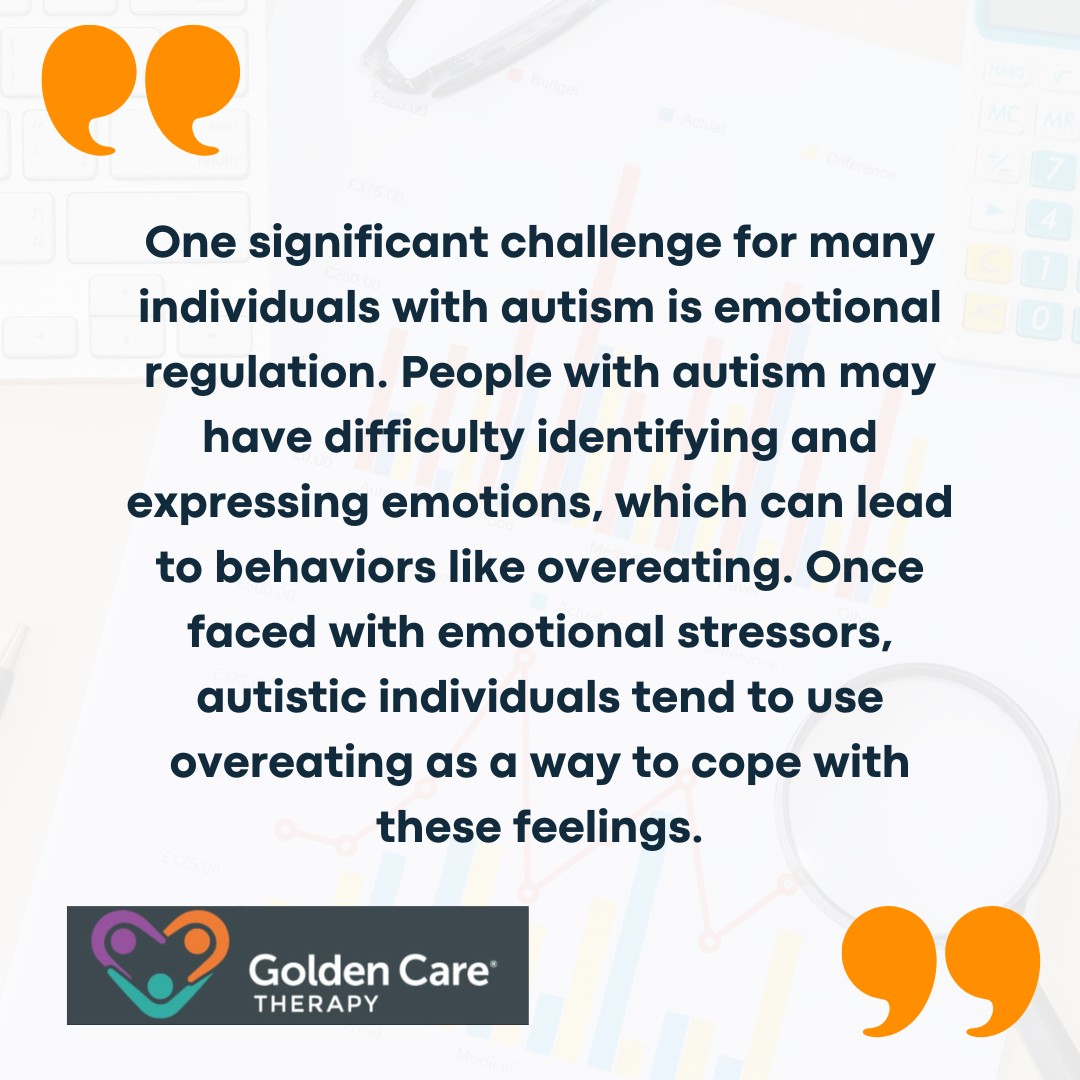Autism affects individuals in various ways, and one aspect that often goes overlooked is the relationship between autism and overeating. For many individuals on the autism spectrum, eating habits can become a source of concern.
Overeating in autism can arise from a variety of factors, such as sensory sensitivities, rigid routines, or emotional regulation issues. Understanding these underlying causes can help caregivers, clinicians, and family members offer appropriate support and solutions to manage eating behaviors.
That said, let’s explore the connection between autism and overeating, why it happens, and how to address it with effective strategies.
Sensory Sensitivities and Food Choices
Individuals with autism often experience heightened or diminished sensory sensitivities, which can significantly affect their food preferences and eating behaviors. Sensory processing issues in autism can manifest in the way food textures, tastes, and smells are perceived.
For some, the sensation of certain foods may be overwhelming, leading them to avoid certain textures or flavors. In contrast, others may crave specific food textures or tastes that provide comfort, even if they are unhealthy or lead to overeating.
These sensory sensitivities can cause an individual to either overeat or exhibit selective eating patterns.
For instance, some individuals may consistently eat foods that feel or taste “just right,” while others may seek out particular textures that satisfy sensory needs. This can result in a preference for high-calorie, highly palatable foods, which might contribute to overeating.
Behavioral Patterns and Routines
People with autism tend to develop strong routines and rituals that help them feel secure. Eating behaviors are no exception.
For some individuals, mealtimes may become rigid and repetitive, leading to overeating if they associate eating with specific times or rituals. Others may eat large amounts of food during specific times of the day, regardless of hunger, as part of a predictable routine.
The need for structure in everyday life can extend to eating habits, and when a routine is disrupted or altered, it may cause emotional distress. This distress might manifest in overeating as a way to self-soothe. Overeating can then become a coping mechanism to manage anxiety or frustration, especially if food provides a sense of comfort and predictability.

individuals tend to use overeating as a way to cope with these feelings.
Food can provide a sense of calm or relief for some individuals, making it a go-to strategy for managing overwhelming emotions.
Unfortunately, using food as an emotional coping mechanism can lead to unhealthy eating habits and excessive calorie intake. This is particularly concerning if it results in weight gain, digestive issues, or other health problems.
Social and Environmental Factors
Autism often affects social interactions, which can also influence eating behaviors. Some individuals with autism may struggle with social cues or feel isolated during meals, leading them to turn to food for comfort.
Social situations, such as eating with family members, at school, or social gatherings, can be overwhelming, causing individuals to eat in excess to deal with social anxiety or the discomfort of these settings.
Additionally, environmental factors, such as access to food, family dynamics, or lack of structured mealtimes, can contribute to overeating. If a person with autism has easy access to food, they may engage in overeating as a way to self-regulate or fill emotional gaps.
Caregivers need to create an environment that fosters healthy eating habits and addresses any emotional or social challenges.
Overeating as a Result of Limited Communication Skills
One of the hallmark features of autism is difficulty with communication, whether verbal or non-verbal. This can lead to overeating when an individual is unable to express feelings of hunger or satiety adequately.
Instead of communicating their needs, they may resort to eating when they are upset, anxious, or bored. Food may become a non-verbal way of managing discomfort or expressing needs that they cannot articulate.
In these cases, overeating can be a form of behavior that serves as a means of communication.
For example, when an individual with autism is hungry, anxious, or experiencing sensory overload, they might eat in response to these emotions, especially if they are unable to express themselves verbally.
Therefore, helping individuals with autism develop communication skills and tools can improve their eating habits and reduce the tendency to overeat.
Impact on Physical Health and Well-Being
Overeating in individuals with autism can have significant implications for their physical health.
As with any population, consuming excessive amounts of food, especially foods high in sugar, fat, or salt, can lead to weight gain, increased risk of obesity, and other health problems like diabetes, hypertension, and heart disease. Additionally, overeating can exacerbate gastrointestinal issues, which are common in individuals with autism.
Incorporating healthy eating habits and promoting regular physical activity are essential steps in maintaining overall well-being. Since many individuals with autism may be at a higher risk for obesity and related health issues, it is crucial to develop a plan to address overeating early and consistently.

6 Strategies for Managing Overeating
Managing overeating in individuals with autism requires a multi-faceted approach that takes into account sensory sensitivities, emotional regulation, and environmental factors.
The following strategies can help address the issue:
Develop a Structured Eating Routine
Creating a consistent and predictable mealtime schedule can help regulate eating behaviors and prevent overeating. By offering meals and snacks at set times throughout the day, individuals with autism may be less likely to eat impulsively or excessively. A structured eating routine can also help reduce anxiety around food and mealtimes.
Address Sensory Sensitivities
If sensory sensitivities contribute to overeating, it may be helpful to offer a variety of food textures and flavors that are appealing to the individual. In some cases, a sensory-friendly diet that accommodates their preferences may reduce overeating.
Occupational therapy can also help individuals with autism learn to manage sensory sensitivities, making food-related experiences more comfortable.
Implement Emotional Regulation Strategies
Teaching individuals with autism emotional regulation techniques can help them cope with stress or frustration without turning to food. Techniques such as deep breathing, mindfulness, or sensory activities (e.g., fidget toys or weighted blankets) can reduce the need to use food as a coping mechanism.
Behavioral therapy or applied behavior analysis (ABA) therapy may also help improve emotional regulation and reduce overeating behaviors.
Encourage Communication and Social Interaction
Improving communication skills can help individuals with autism express their needs, including hunger and satiety cues. Communication methods such as picture exchange communication systems (PECS) or augmentative and alternative communication (AAC) devices can support individuals in expressing themselves more effectively.
Additionally, fostering positive social interactions during mealtimes can help reduce stress and anxiety, which may decrease overeating tendencies.
Promote Healthy Eating Habits
Encouraging a balanced diet can help prevent overeating. Caregivers and clinicians can work with individuals to make mealtimes more enjoyable by introducing new, healthy foods and incorporating enjoyable food preparation activities.
Offering smaller portions and limiting access to high-calorie snacks can also reduce the likelihood of overeating.
Monitor Weight and Health
Regularly monitoring the individual’s weight and overall health is essential for detecting any potential health concerns related to overeating. If weight gain or other health issues arise, it is important to consult with a healthcare professional who specializes in autism to develop a comprehensive plan to manage the eating behaviors.
Final Thoughts
Overeating is a common challenge for many individuals with autism, but with the right understanding and interventions, it can be managed effectively. By addressing the sensory, emotional, and behavioral factors contributing to overeating, caregivers and clinicians can help individuals with autism develop healthier eating habits and improve their overall well-being.
Providing structure, supporting communication, and encouraging emotional regulation will help us create a supportive environment that helps individuals with autism manage overeating and its associated challenges.
Additionally, promoting healthy eating habits and regular physical activity can reduce the negative impact of overeating on physical health. At Golden Care Therapy, we provide high-quality ABA therapy in New Jersey, Indiana, New York, Georgia, and Florida, focusing on personalized support tailored to each individual’s needs.
We are dedicated to helping families achieve meaningful progress and lasting positive outcomes. Contact us today to learn more about how we can support you and your loved ones on this journey.

